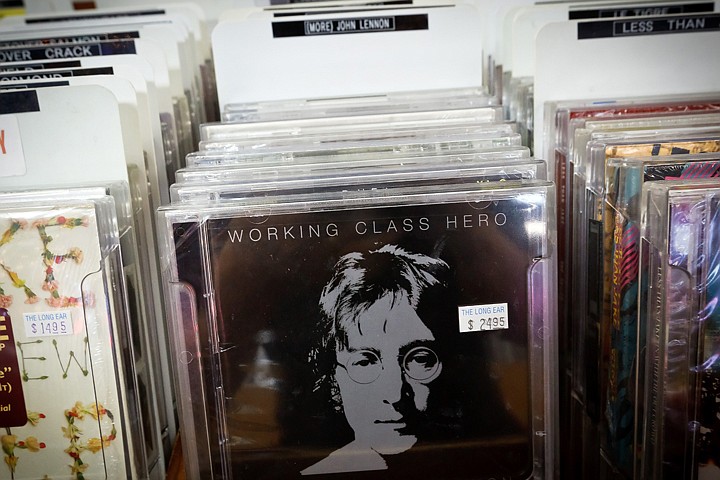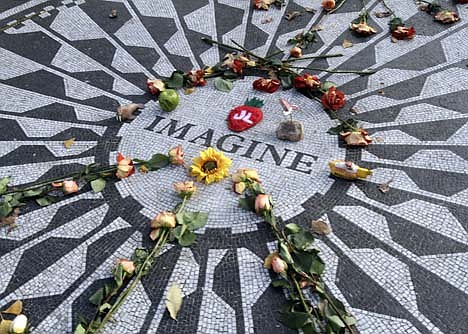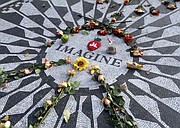Imagine
Alecia Warren | Hagadone News Network | UPDATED 15 years, 1 month AGO
Swooning is the best word, Deon Borchard said.
That's what she saw her junior high friends doing in the '60s when they started listening to a new British group called The Beatles.
"I didn't even know what that word meant, but I was watching what they were doing, and they were doing that," remembered Borchard, co-owner of The Long Ear Cd's and Stuff in Coeur d'Alene. "They would go see all The Beatles' movies like 'A Hard Days Night,' and they would be sitting there and crying and screaming. I didn't get it, that wasn't my style. But it was pretty impressive."
Deon believed that adoration was still prevalent on Wednesday, the 30th anniversary of John Lennon's death.
Even 30 years after thousands gathered around the singer's New York apartment for a candlelight vigil, even decades after The Beatles' music evolved into a force for social and cultural change, the music and ideals of Lennon and The Beatles still have an impact today, Deon said.
Even in North Idaho.
"Beatles music hasn't really slowed down. Since we opened, it has been popular, and it has remained so," she said, adding that The Long Ear has been selling music for 35 years. "I think the relevance is always going to be there."
Customers young and old still buy Beatles CDs at the Coeur d'Alene store every day, Deon said - and to a lesser extent, the members' solo albums.
"This week I sold a couple Lennon things to people who probably weren't aware of the significance of the date. They were probably just buying Lennon," she said.
Younger generations in particular are eager to hear her stories about The Beatles' era, she added, and on Tuesday she saw a teenager inspecting a Beatles vinyl.
The music racks are filled with Beatles music covers, too, from bluegrass versions to heavy metal covers to vocal-less baby lullabies. Deon recently saw the Cirque du Soleil LOVE show that features a remix of Beatles hits.
"The Beatles obviously speak to such a wide flock of people, across all different ages and economic factors," she said.
That's partly because it's just great music, said Terry Borchard, Deon's husband and co-owner of The Long Ear. Brilliant, fun songwriting spanned the group's entire career from 1960 to '70, he said.
But beyond that, there's also the appeal of the progressive ideals the group espoused, he said, Lennon leading the way.
"John was for peace, love and understanding," Terry said. "Those are still universal truths they put out there."
Deon still remembers the shock wave The Beatles caused when they came to the U.S. in the mid '60s, she said.
"They were the first band to come and be so different from everything else," she said, adding that she was living in southern California at the time. "The Beatles were so completely unique, everything from their style to their longer hair."
Initially the group only churned out simple pop tunes, she said, with hits like "I Want to Hold Your Hand" and "She Loves You."
What ingrained The Beatles in history was their shift into socially relevant music in the late '60s, she said, especially after a visit to India in 1968.
Suddenly their music offered commentary on the angst of the world grappling with the Vietnam War and emerging social movements, she said.
John Lennon was the most political of the foursome, Terry said, propounding peace and tolerance. The store owner recalled Lennon's pacifist efforts, like his and Yoko Ono's "bed-In" peace demonstrations in 1969 at the Amsterdam Hilton and the Queen Elizabeth Hotel in Montreal.
"At that time, people were listening to music and it had a profound effect on everything. Culture, politics, whatever happened," Terry said. "The Beatles were at the forefront of everything. For that time and throughout John's life, he and Dylan were probably the most important songwriters."
Lennon's solo pieces in particular like "Imagine," and "Give Peace a Chance" embodied such social statements. The music was more than just a soundtrack to the times, Deon said, but an integral part of the country's shifting perspective.
"I think a lot of people went through the same types of emotions and same type of growth The Beatles went through as they were changing," she said. "As The Beatles grew up and became aware of society, that's what we were doing. We were saying, 'Wait a minute. What's the reason for this war? Why are we going to Vietnam?'"
Deon still remembers when she heard that Lennon had been shot and killed by a deranged fan on December 8, 1980.
Fans mourned like a loss in their own family, she said.
"When John Lennon was killed, it was like someone killed our innocence," she said. "Like someone killed someone we loved."
The loss was great for Bob Brown, too.
"I really had come around to the point that he was by far the most thoughtful and caring of the four Beatles," said Brown, secretary of Opera Coeur d'Alene and past president of the Idaho Commission on the Arts.
Brown, who attended UC-Hastings law school in San Francisco from 1965 to 1971, found that messages of artists like The Beatles paralleled the protests and demonstrations he constantly attended, he said.
"It was their willingness to be so direct and up front about where they stood, like on the war in Vietnam," he said, adding that his views don't represent Opera Coeur d'Alene. "That's when I became aware that they (The Beatles) were stepping forward and doing things like the Mamas and the Papas, Joan Baez and Bob Dylan. They were joining that group, rather than the group of teeny bopper heroes."
But he feels The Beatles' impact has faded over time.
Even among his own generation.
"Maybe we've outgrown those things that were so important in 1962," he said. "It was so fresh. It was so different. The whole world was changing."
He doesn't see The Beatles' message having the same place in today's society, he added. For instance, the interest in the Iraq and Afghanistan wars don't compare to what occurred during Vietnam.
"Who do you know that really talks about those two wars? Does anybody come up and say, 'Bad day today, somebody got bombed by mistake?'" he said. "I don't know of anybody who talks about the war."
But Chelsea Fritze, 25, thinks The Beatles still have a role to play.
The co-manager at The Long Ear started listening to The Beatles just as an obligation as a music lover, she said.
She has come to love the group and John Lennon, she said, because of the way he incorporated the message of improving the world into his music.
Especially "Imagine," she added.
"There are elements of that music that still hold true today," Fritze said. "Kids my age, we still want a peaceful world. Everybody wants that peaceful world."
ARTICLES BY ALECIA WARREN
Tribe's property taxes canceled
After a meeting with Coeur d'Alene Tribe officials today, Kootenai County commissioners voted unanimously to cancel all property taxes on reservation land from the past four years.
In hot water
Idaho DEQ says temps are too warm for trout
We like our fish cooked... But not before we catch them.
Past issues
Old charge blocks weapons permit
A Hayden resident believes his rights were violated when he was disqualified from obtaining a concealed weapons permit because of a felony charge from over 40 years ago.



